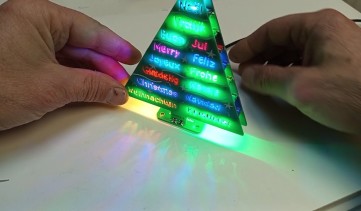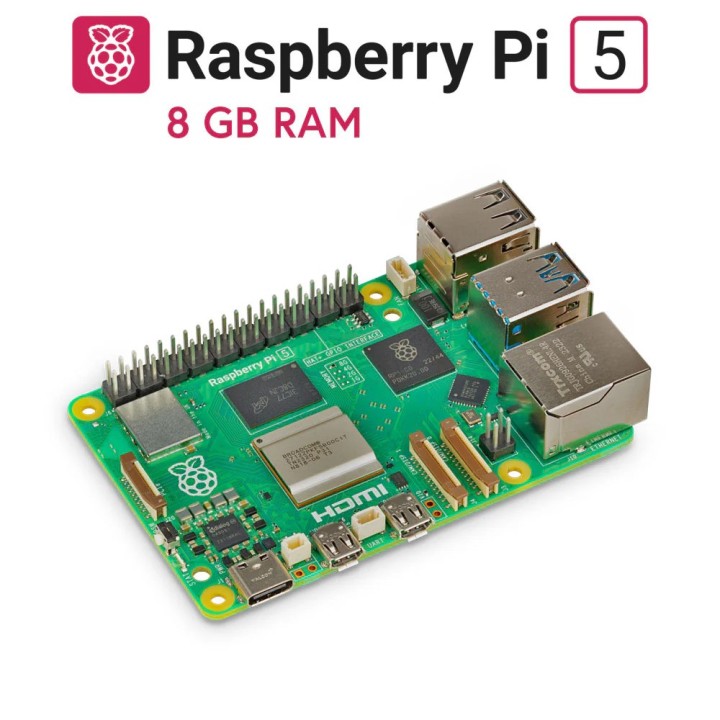Raspberry Pi
Watch: The Raspberry Pi 5 Desktop Kit
Interested in Raspberry Pi? So are we! Elektor’s engineers and editors are currently planning for more Raspberry Pi-related videos. Once we have more details, we will post all the information here and on the Elektor Webinars page. Stay tuned!
Raspberry Pi Projects and Applications

Raspberry Pi as a KVM Remote Control: Pi-KVM Software Test
KVM, short for keyboard, video, mouse, allows remote control of a computer by anyone with access to it. With the smart Pi-KVM software and a Raspberry Pi 4 SBC, you can affordably manage a PC and other devices over the Internet without requiring software installation on the remote computer. Additionally, Pi-KVM facilitates the provision of virtual disks, enabling not only remote control and maintenance of a computer but also complete reinstallation if needed.Download article

Audio DAC for Raspberry Pi
If you are looking for a small stand-alone network audio player, why not build your own? In this article, Ton Giesberts explains how he built a high-end DAC for the Raspberry Pi using components with top-notch specs. He used the Volumio free open source Linux distribution for music playback. Go ahead: turn your Raspberry Pi into a small stand-alone network audio player!Download free article

A Smart Object Counter: Image Recognition Made Easy with Edge Impulse
Interested in machine and Raspberry Pi? This project is for you. Read on to learn how to transform a camera and a Raspberry Pi into a smart object-counting tool using the Edge Impulse platform. The article covers the following and much more: getting starte with Edge Impulse, model testing, and Raspberry Pi deployment.Download free article

Java on the Raspberry Pi
Have you considered Java on the Raspberry Pi? But wasn’t the Raspberry Pi designed to be programmed using Python? Maybe yes, but that doesn’t mean you can’t use other languages. For instance, the Java programming language is highly applicable for crafting code on contemporary computing platforms like the Raspberry Pi. In this article, Frank Delporte demos Java's prowess by delving into its background and exploring how you can use it to manipulate and read GPIO pins.Download article
Raspberry Pi 5

The Raspberry Pi 5
The Raspberry Pi 5 has the same compact credit card size as previous generations, but a lot has changed while maintaining this size and format. Let’s start with the CPU on board, the Cortex-A76 CPU clocked at 2.4 GHz, and a Video Core 7 GPU at 1 GHz. The Raspberry Pi 5 (RPi 5) offers a considerable leap in performance. We’ll dive into this and look at some benchmarks.Download free article

Raspberry Pi 5 vs Raspberry Pi 4: A Comparison
What is the difference between the Raspberry Pi 5 and the Raspberry Pi 4? Just how significant are the improvements in speed and performance between the Raspberry Pi 5 and its predecessor, the Raspberry Pi 4? The advancements are substantial, with a multitude of features having been enhanced or introduced. It's safe to assert that the Raspberry Pi 5 boasts twice the speed of its predecessor. In this article, Elektor engineer Saad Imtiaz delves into the incorporated features, benchmark evaluations, thermal performance, and more.Read online article

Raspberry Pi 5: A First Look
Elektor engineers and editors were among the first to report the Raspberry Pi 5 when it was announced in September 2023. Whether you are looking for more speed, more power, or more features, the Raspberry Pi 5 checks all the boxes when compared with its predecessors. With a 64-bit Arm Cortex-A76 at the helm, it runs four cores at 2.4 GHz, which means a roughly 2.5x increase in performance over the Raspberry Pi 4’s Cortex-A72 running at 1.8 GHz. Check out all specs and watch our unboxing.Read online article

CaptureCount: An Object Detector and Counter on the Raspberry Pi 5
As soon as Elektor engineer Saad Imtiaz got his hands on a Raspberry Pi 5, he started brainstorming new projects. One of those projects was the CaptureCount object detector and counter. He had clear goal for the project: to develop an object detection and counting system capable of identifying object types and tallying the number of objects within each category detected. The Raspberry Pi 5 emerged as the natural selection for its adeptness and backing in AI initiatives.Download article
Raspberry Pi RP2040 and Raspberry Pi Pico

Raspberry Silicon: Introducing the Raspberry Pi RP2040 MCU and the Pico Board
Get to know the Raspberry Pi RP2040 microcontroller and the Pico Board. The Raspberry Pi Pico is the first microcontroller board based on the RP2040. It looks a lot like other microcontroller boards with the MCU in the center, a micro-USB connector on one end and a row of contacts along each side. A 3-pin debug connector is available at the other end of the board.Read online article

Hello World from the Raspberry Pi Pico and RP2040
Take a closer look at at Raspberry Pi’s first microcontroller and microcontroller chip. In this helpful background article, SparkFun's Avra Saslow introduces the Pico and RP20240, and she then shares details about SparkFun RP20240-related products.Download article

Going Dual-Core with the Raspberry Pi RP2040
The RP2040 microcontroller from Raspberry Pi stands out for its unique features. Unlike many mainstream microcontrollers, it's a dual-core device. While other dual-core controllers typically merge two distinct cores, each designated for specific tasks, the RP2040 boasts two identical ARM Cortex-M0+ cores. Watch Elektor's insightful video about the RP2040.Read online article

Pico Power: Get to Know the Raspberry Pi Pico Board and RP2040
The Raspberry Pi Pico serves as a link between your powerful Linux-based SBCs and the realm of embedded microcontrollers. While it bears the Raspberry Pi name, the Raspberry Pi Pico diverges significantly from its predecessors. This dual-core ARM-powered board provides only the essential circuitry needed for operation. Despite its resemblance to a modified Pi Zero, it stands apart. Unlike other Raspberry Pi boards utilizing Broadcom CPUs, the Pico employs the in-house-designed RP2040 chip crafted by the Raspberry Pi Foundation itself.Read online article
Raspberry Pi Products

Raspberry Pi Global Shutter Camera
The Raspberry Pi Global Shutter Camera excels at capturing rapid motion. The 1.6 MP camera is well-suited for fast motion photography and machine vision apps, where even slight distortions can significantly impair inference performance. The Raspberry Pi Global Shutter Camera is mounted on a 38 mm×38 mm board. Let's take a look.Read online article

Introducing the Raspberry Pi Debug Probe
Raspberry Pi's engineers sought a straightforward debugging solution for Arm-based microcontrollers like their RP2040 chips. After developing and testing it themselves, they released the Raspberry Pi Debug Probe as an open-source board for public use.Read online article

Raspberry Pi Compute Module 4
The Compute Module is a stripped-down Raspberry Pi-based module intended to be incorporated into other products that need more design flexibility than the usual Raspberry Pi can offer. Also, it enables you to tightly integrate custom electronics around the Raspberry Pi SOC (e.g., for industrial usage or digital signage). The Compute Module 4 comes in several varieties. You can select wireless or no wireless, onboard EMMC with 8, 16 or 32 GB or no onboard EMMC and 1, 2 ,4 and 8 GB of RAM. This means you can select the version that’s just right for you!Download article

Review: Raspberry Pi 4
Elektor was ready to test and design as soon as the Raspberry Pi 4 hit the market. Read on for an overview of the Raspberry Pi 4's specs and features. In typical Elektor fashion, we took a deep dive into everything, from the SoC to the software side of things.Download article













